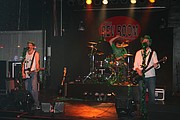SANAA, Yemen (AP) - Heavy fighting between rival army units shook Yemen's capital Friday, killing two soldiers in what could signal the start of a power struggle just days after autocratic President Ali Abdullah Saleh agreed to end his 33-year rule.
The clashes pitted Central Security forces commanded by Saleh's nephew, Col. Yehia Saleh, against troops from the First Armored Division, headed by Gen. Ali Mohsen al-Ahmar, who defected and joined the protesters in March. The crackle of automatic weapons and the heavy thud of mortars echoed across the city.
One soldier from each side was killed before the fighting stopped around dawn, a security official said on condition of anonymity because he was not authorized to brief the media.
The two units have clashed in the past, but Friday's fighting was the first showdown since Saleh signed a U.S.-backed proposal Wednesday in the Saudi capital Riyadh. Under the agreement, Saleh agreed to pass power to Vice President Abed Rabbo Mansour Hadi within 30 days, after a new government sworn in by the vice president passes a law protecting Saleh and his associates from prosecution.
Hadi is also to call for early presidential elections to be held within 90 days.
Also Friday, opposition parties that signed the Gulf deal selected Mohammed Basindwa as prime minister, said opposition leader Abdullah Obal. Under the deal's terms, the vice president is expected to charge him in the next few days with forming a national unity government.
Basindwa, though an independent, has held numerous positions in Saleh's government, including foreign and information minister.
If the Gulf deal holds, Saleh would be the fourth dictator pushed from power this year by the Arab Spring uprisings. But the agreement does not guarantee far-reaching political changes like those brought about by the uprisings in Tunisia, Egypt and Libya.
It does not ban Saleh from returning to Yemen, so he won't be exiled like ousted Tunisian strongman Zine El Abidine Ben Ali. And it protects Saleh from prosecution, so he won't be put on trial like Egypt's Hosni Mubarak.
Amnesty International and Human Rights Watch criticized the immunity clause, saying it protects those who violated human rights.
"Immunity leads to impunity. It denies justice and deprives victims of the truth and full reparations," Amnesty said in a statement Thursday.
Many of the protesters who have braved months of lethal government crackdowns to demonstrate for democratic reforms have rejected the deal. On Friday, hundreds of thousands of protesters took to the streets in cities across the country to denounce the agreement and call for Saleh to be put on trial for crimes ranging from corruption to lethal crackdowns on protests.
In Sanaa, mourners carried aloft the coffins of five protesters killed Thursday through the capital's main protest camp.
Fuad al-Hameeri, an imam, captured the spirit of the crowd, warning Saleh in an address to the protesters that "the blood of the martyrs that pushed you from power is the same that will put you in prison and push you into court."
Human Rights Watch accused Yemeni forces Friday of committing war crimes by indiscriminately shelling civilians areas including a hospital and a central square in the city of Taiz, a hotbed anti-Saleh sentiment where armed tribesmen who support the protesters have engaged in fierce battles with government troops.
The New York-based group said the shelling caused most, if not all, of the 35 civilian deaths in the city since late October. It also said opposition fighters fought from densely populated areas, "unlawfully placing civilians at grave risk."
Human Rights Watch called on the U.N. Security Council to impose a travel ban on Saleh and not respect the parts of the Gulf deal that protect him from standing trial.

